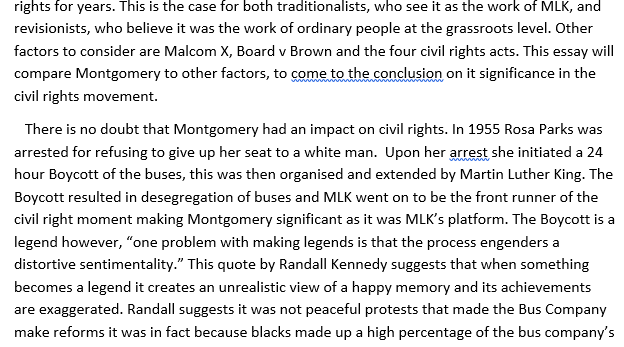How to Write History A-Level Coursework

If you are unsure of how to write history A-level coursework, you need to get some tips and advice from past students. First, you need to make sure you know what context your book was written in. This means researching the author and the changing attitudes at the time. Secondly, you should look for two books of different times to see what kind of evidence is available. For example, a book written in the 1970s will not offer the same degree of hindsight as a book written in the present.
300-level courses
As a general rule, you should never take more than three credits in any one history course, so you’re likely to get a failing grade. If you’re not sure what to write about, here’s some advice: Focus on one or two major dimensions. If you’re writing about the topic of World War I, make sure you give the reader an idea of the scholarly concerns of the field.
Generally, upper-level history courses are organized by region. Students taking 100 and 200-level courses study broad spans of geography, while 300-level history coursework focuses on a particular theme. Usually, students will take at least two courses in each area each semester. In some universities, you must complete a 300-level history course to qualify for 500-level courses, which deal extensively with historiography and require a written research project.
The course will also introduce you to the methods of historical research, historiography, and the use of theory in history. The course culminates with a large research paper based on primary source material. It is important to note, however, that the subject matter of the history course is often vast and varied. While the course’s structure is often similar, its objectives are very different. Generally, this kind of coursework covers topics about the past, present, and future.
The course traces the 500-year history of British imperialism. It covers global topics, such as the causes of empire, mechanics of expansion, the impact of empire on the mother country, and the reasons for decolonization. A successful history course will be structured around a clear outline of topics, but also include a good amount of reading and writing. The course aims to introduce students to the discipline and to develop their writing skills.
While 100-level history courses use textbooks and supplemental readings, 300-level courses typically use primary and secondary sources and assign at least 100 pages of written work weekly. A few hundred-level courses also incorporate short student presentations and discussions. Students are expected to write five interpretive essays or critique five or six partner work to pass the course. Often, the course will require a final exam. For most students, the final exam is the biggest test.
HIST 295 introduces students to the many facets of historical inquiry. The focus of this course is on the philosophy and nature of history, as well as historical interpretation, research, analysis, writing, and practical application. In addition, students will be introduced to the methods of sustained historical inquiry. These common technologies can help elucidate questions in new ways and transform the way historians view historical data. It’s also essential to remember that you’ll be presenting your own ideas and research.
If you’re worried about writing a 300-level history essay, you can always ask for help from your instructor. They can offer suggestions and provide examples to get you started. They’ll also offer you an idea of what to write about in your essay. The most important thing is to be honest and thorough. After all, it’s your history, so you shouldn’t sugar-coat anything. However, do make sure that your ideas are well-thought-out and well-supported.
Directed Study (HIST 489)
If you are interested in exploring a specific topic of history but do not have a sufficient amount of time to complete it, consider taking HIST 489: Directed Study in History. This course explores a modern Middle Eastern country’s social, economic, and political history, and may be taken up to three times. The focus of this course is on the origins and evolution of nationalism in the region. It explores the relationship between nationalism and conflict in this region, using social biographical portraits of non-elite men.
This course requires a minimum of 12 credits. It requires extensive reading and at least one written report. You must have junior or senior standing in history and have a 3.0 GPA in your major coursework to take this course. A History major must have permission from a professor before enrolling in this course. You must also complete HIST 301 before you can take this course. For further information about this course, visit the Department of History.
Directed Study (HIST 489) in History can be taken at university. It involves independent research involving a historical, cultural, or governmental organization. You can take it twice for six units, or up to nine for 12 units. This course is graded credit/no credit. It is a prerequisite for a university graduation requirement. For the most part, Directed Study in History A level coursework is taken for credit.
The subject of World History, or HIST 489, is an interdisciplinary course in history. It spans the period from prehistoric times to c1500 AD. It examines the patterns of cultural and economic development, as well as the rise and fall of empires and civilizations. It also explores religion and race tensions in areas of white settlement. It also meets the G and DI designations.
Directed Study (HIST 499) in History A level coursework requires permission from your instructor. You will be guided through the process of transforming research into a product. You will learn to conduct primary source research, craft an abstract, and find appropriate scholarly venues for your research. Then, you’ll turn your written paper into an academic talk. Directed Study in History aims to provide students with a more advanced understanding of the discipline.
Directed Study in History covers the fundamentals of historical analysis, including how to write and teach history. It also explores the practical issues of teaching history. You’ll learn about the various topics of history, including colonialism, decolonization, and reform. You’ll also study the role of women in history. The GWAR Placement Examination requires a score of 11 or higher. In addition, you’ll have to get approval from the GEGC to take this course.
HIST 105 covers the major trends in human history from 1500 to the present. The primary focus of the course will be the spread of Europeans around the world, which continues to transform non-European societies. Modern communication and the global web of maritime shipping has also accelerated the movement of people, goods, and information across long distances. The course will also examine the responses of different cultures to Westernisation.
Senior Seminar (HIST 481)
If you are considering taking the Senior Seminar history course, you’ve likely wondered how to write a great paper. This course is a capstone experience for history majors, and requires you to write a comprehensive paper based on primary sources. During the course, you’ll learn about the history of the topic you’ve chosen, and use analytical and research skills to come up with an engaging article. Here are some tips to help you prepare for this paper.
Depending on the professor and the topic, the Senior Seminar is a critical component of a student’s degree program. The coursework requires students to conduct in-depth research, write a 25-page essay, and defend their thesis. The thesis is a requirement in the history major’s program, so it is important to plan well and research the subject thoroughly. To write the paper, follow the guidelines outlined in the syllabus.
The first step is to determine whether your school requires you to take a seminar. If you want to take this course, you should contact the professor in charge of the course. Aside from the main professor, you should also make sure that your university offers the course. Many colleges and universities offer it for students who want to learn more about the subject. However, you must have permission from the professor teaching the seminar.
In addition to the required coursework for the senior seminar, you must take 15 semester hours of history. This course must be at the 2000-level or above. The courses are filled up quickly, and you could miss out on your graduation if you fail to take them. You must submit your final plan of study through PeopleSoft within four weeks of your last semester. You will have to apply for graduation by this point.
You can also write a senior seminar by learning how to write a historical research paper. The 400-level course in history is a research-based course. Students will be expected to conduct research and write an extensive research paper, using primary sources as the basis for the analysis. You’ll also need to take HIS 301, which is a required methods course. Ultimately, this is the capstone research seminar of your history major. The coursework satisfies two requirements: the requirements for written communication and historical forces.




Leave a Reply